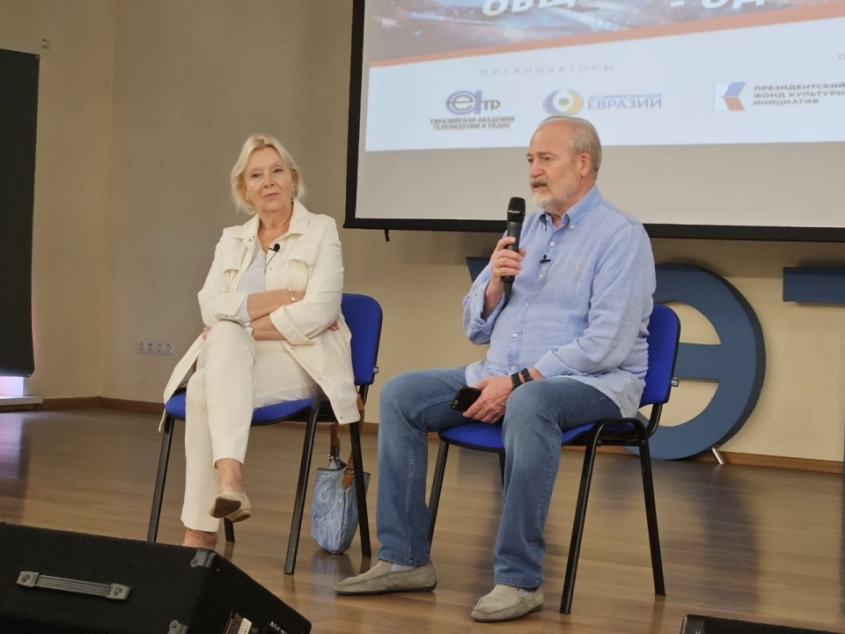
On November 5, as part of the XVIII International Film Festival “WON TOGETHER” at the University College of Economics and Technology of Sochi State University, a master class was held by the famous film director, People’s Artist of Russia, Head of the directing workshops of VGIK and VKSR, Chairman of the jury of the film festival Vladimir Khotinenko and VGIK professor, film expert Tatyana Yakovleva on the topic “Artificial Intelligence and the Future of Cinema.”
“From my point of view, this is the most pressing topic today,” said Vladimir Ivanovich, opening the master class. The topic aroused keen interest among the participants of the creative event. A “live” dialogue took place with the viewers - with those who also comprehend the processes of digitalization occurring in all spheres of human life, including cinema.
Despite the fact that cinema is the youngest of all the arts, it very clearly reflects the experiences that excite human consciousness. And it doesn’t matter exactly what period of time we are talking about. Cinema captures the past, present and future in equal measure.
The starting point for the discussion was Stanley Kubrick's 2001: A Space Odyssey. In his film, Kubrick managed not only to predict the future of humanity, but in many ways accurately reflected those trends that seemed impossible back in 1968. He made one of the most iconic films about space, predicted flat screens, video calls, voice control of computers. Only years later did it become clear that Kubrick was making a far from fantastic film. He made a film about us, about people living in the 21st century!
The audience was shown an excerpt from Kubrick's film, which vividly set the atmosphere of the meeting and introduced the audience into the context of the topic. As Tatyana Vitalievna Yakovleva correctly said:
“We want you to experience both the atmosphere and imagery of this film, which will set you up for our conversation.”
In the excerpt, viewers saw what artificial intelligence is capable of, in the person of the main antagonist of the film - the computer “HAL 9000”. It is incredible that after fifty years, this idea of artificial intelligence has become a reality: a machine that is capable of calculating human actions, pursuing certain goals that run counter to universal human values.
Of course, humanity has not yet reached the stage of AI development when a machine can subjugate a person. But, nevertheless, it has approached the brink where this can happen. AI is already beginning to enter all facets of human activity and even cinema.
However, this process is usual for cinema. Tatyana Vitalievna talked about how, over the years, cinema was transformed and saturated with new inventions. First it was the arrival of sound, then color, then the transition from film to digital devices. Now, AI is becoming more and more involved in film production. It is no longer something futuristic and has a significant impact on film production.
Like any other innovation, artificial intelligence has caused both a wave of joy and concern. As Vladimir Ivanovich said, this innovation has two sides. Now directors are using neural networks for a variety of tasks: from facial recognition technology to writing scripts, and he, as a director, is incredibly interested in exploring this innovation and trying to work with it in his future films.
On the other hand, the idea naturally arises that AI can replace humans, thereby simplifying film production. The strikes of screenwriters and actors in Hollywood are proof of this.
However, the experts urged the audience not just to get used to the reality that surrounds us. It is necessary to comprehend these processes and listen to those who, many years before, warned humanity about what could await them.
After the speech, Vladimir Khotinenko and Tatyana Yakovleva answered questions from the audience. Listeners asked what would happen if artificial intelligence completely replaced humans? Vladimir Ivanovich, like Stanley Kubrick in his film, called for thinking about the danger that may lie in wait in the future. However, according to the Chairman of the Film Festival Jury, be that as it may, no technology can fully replace human communication.
The questions also concerned the creative path of Vladimir Khotinenko. Vladimir Ivanovich noted that, having come to the new yet unknown world of cinema, he could not imagine what awaited him. “But you need to be able to overcome the “fear of the unknown”! As for crises, they are an integral part of the creative process. You need to be able to overcome them, especially since they give new impetus for creative thinking,” -Khotinenko said.
Author: Maxim Petrov


